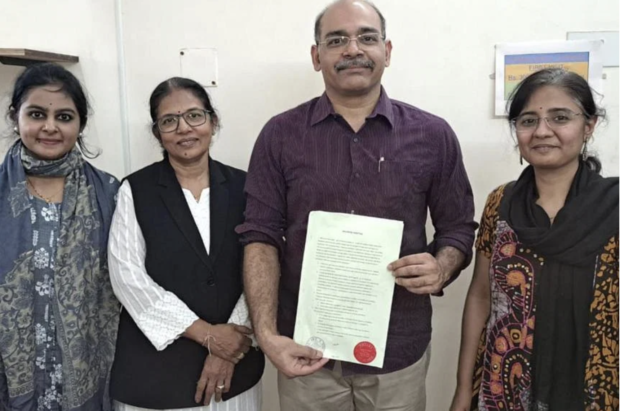Easing of rules in India to support right to ‘die with dignity’

Dr Nikhil Datar holding a copy of his living will, with (from left) witness Nitya Vaidya, advocate and public notary Jagruti Shah and witness Charmi Deshmukh.
PHOTO: COURTESY OF NIKHIL DATAR via The Straits Times/Asia News Network
NEW DELHI – Back in December 2020, Dr Nikhil Datar pledged to donate his organs and hopefully save lives even after his death. He took another step recently – this time to ensure his death is as painless and dignified as possible.
On Feb 24, the 53-year-old gynecologist and obstetrician based in Mumbai reportedly became the first Indian to formalize a “living will” since the country’s Supreme Court relaxed rules in January, making it less cumbersome to draft such a document.
A living will, also known as an advance medical directive, is a set of instructions that specify the medical or legal decisions that a person wants others to make for him if he is terminally ill and becomes unconscious or incapable of making these decisions. This can include authorization to withhold or withdraw medical and surgical intervention.
“One of the offshoots of advances in medical care is the possibility of prolonging someone’s death meaninglessly,” Dr Datar told The Straits Times. “This severely compromises a dying person’s dignity. I don’t want to be stuck in that situation but to pass away happily, smoothly and in as pain-free a manner as possible.”
Dr Datar’s will authorizes his wife to take decisions on his behalf, including to “accept or refuse treatment” as well as “withhold, withdraw life-sustaining measures” in case he develops an “incurable, irreversible illness”.
Passive euthanasia was legalized in India in 2018 for people with a living will, but drafting such a document required the counter-signature of a first class judicial magistrate, a judge who serves in the lower rungs of India’s criminal court structure.
However, in a country where courts are overburdened, access to such a judge is difficult, especially for laypeople unfamiliar with the labyrinthine networks of India’s lower judiciary.
“There’s a lack of knowledge even within the system itself about what needs to be done,” noted Dr Dhvani Mehta, a lawyer who represented the Indian Society of Critical Care Medicine in its case filed in the Supreme Court in 2019 seeking a relaxation in rules for living wills.
She told ST that all judicial magistrates they approached to formalize such wills were not aware of the 2018 judgment that allowed people to create advance medical directives. Neither did they have any idea about what had to be done.
“It required us to get an order from a higher judge, who would then designate the judicial magistrate to actually execute this directive,” she said.
The court has now done away with this process, allowing individuals instead to formalize such a document with attestation by public notaries or gazetted senior government officers, who are more accessible.
It also relaxed rules that involved three-tier checks – by an internal medical board at the hospital for a preliminary opinion, followed by another board constituted by the district collector, before a final physical verification of the patient by a judicial magistrate.
The second board can now be constituted by the hospital but with a nominee from the chief medical officer of the district, instead of being set up by the more senior and busy district collector, and comprise doctors with fewer years of experience. Moreover, a judicial magistrate need not visit the patient and only has to be informed for record-keeping before directions in a living will are carried out.
The government as well as the court had expressed concern over the possible “misuse” of living wills, but Dr Raj K. Mani, a critical care specialist and former president of the Indian Society of Critical Care Medicine, noted that court-mandated checks, including the constitution of two medical boards, are in place to address these concerns.
“Everything has a process, its pluses and minuses, but that doesn’t mean we don’t have it at all,” he told ST.
The Singapore Parliament passed the Advance Medical Directive Act in 1996 and it came into effect in 1997.
In India, those pushing for greater adoption of living wills are hopeful the recent relaxation will encourage a wider discussion about the need for such a document and promote its adoption in India.
Dr Datar has uploaded a draft of his living will on his personal website so that others can use it to build theirs, and has been speaking about it at public fora. “It is a difficult topic for a son or a daughter to talk about to a parent in India,” he said, hoping more media reporting on living wills can help Indians broach this subject with their families.
Dr Mani said the relaxation “will promote appropriate and compassionate management of dying patients” .
The court’s latest order will also create a better understanding of death and dying in India, “correctly orienting the society to the needs of the dying”, he added.
“We have been ignoring their needs by chasing only curative intent all the time… If you ignore a whole lot of people who are dying and their needs, I mean, what kind of society are we? We are pretty brutal.”
RELATED STORIES































